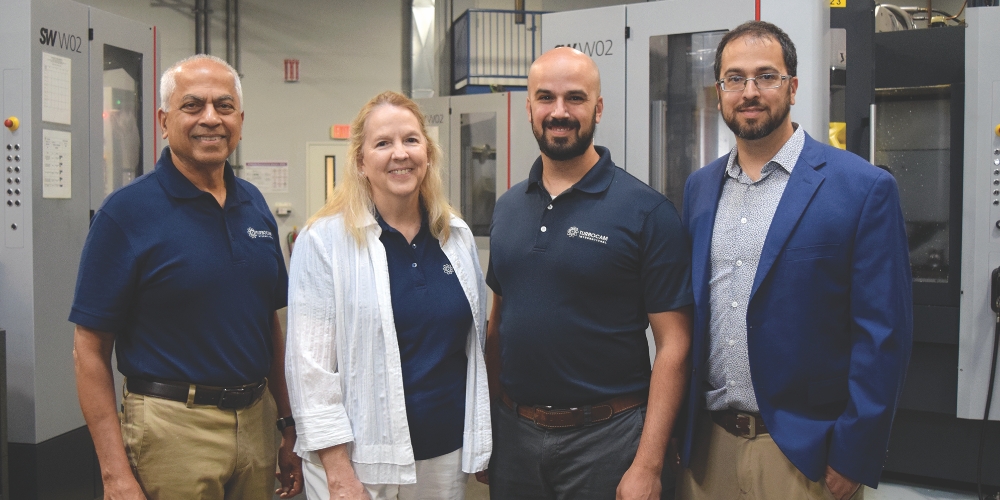%20Alex-and-Jason-in-front-of-map-sm.jpg) Alex Henkel, right, and Director of Finance Jason Wilder stand by a map of the more than 110 countries where Electronic Imaging Materials has shipped since Jason joined the company as a high school senior, working throughout his time at Keene State College. (Photo Courtesy by Elena Babushkina)
Alex Henkel, right, and Director of Finance Jason Wilder stand by a map of the more than 110 countries where Electronic Imaging Materials has shipped since Jason joined the company as a high school senior, working throughout his time at Keene State College. (Photo Courtesy by Elena Babushkina)
Alex Henkel has been hosting interns for years at Electronic Imaging Materials, his custom label printing company in Keene. The interns usually take on specific projects, and during one semester, some years ago, a chemistry intern was developing ways to quickly identify alternative raw materials that had similar characteristics.
Then, one of the raw materials that Electronic Imaging Materials used frequently was discontinued. “All of a sudden it wasn’t theoretical anymore,” says Henkel, who is president of the company. Using the intern’s work, Henkel was able to quickly identify a replacement.
“This made a major impact on our business because we avoided a major disruption,” he says. “It really illustrated the mutual benefit you can get working with interns. That’s something we’ve found over and over again.”
Gone are the days of interns fetching coffee and making copies. Today’s interns are well-trained and looking for meaningful work experiences, experts say. Internships are key for building a hiring pipeline, and also bringing an infusion of new ideas and the latest training into a company.
“The best way to increase visibility is to have an internship program,” says Denise Cave, employer relations team lead for online career services at Southern NH University (SNHU) in Manchester. “The employers who are going to be left behind are the employers who do not [have internships].”
Given the aging demographics of the NH workforce, internships are also key for attracting and retaining young talent in the Granite State. “We’re all about increasing our chances of retaining the next generation here in New Hampshire, and internships are a big part of that,” says Corinne Benfield, executive director of Stay Work Play NH, a nonprofit focused on attracting young people to the Granite State.
Creating Meaningful Internships
Modern internships have evolved to benefit both the student and the company, but perceptions of internships haven’t always kept up. “There’s that misconception that internships are busy work and they’re not impactful work,” says Benfield. “That’s definitely not the case.”
Stay Work Play’s intern, Carleigh Brown, 22, is working on a dashboard to connect interns and NH businesses. Her work will be part of an internship guide for employers released by Stay Work Play toward the end of the summer. (Bangor Savings Bank is sponsoring her summer internship with Stay Work Play.)
Brown, who is entering her senior year at the University of NH, says interns can provide value to companies. “Due to the fact that we’re actively learning things we can add a unique perspective,” she says.
Speaking of value, in most cases interns expect to be paid a competitive wage. Brown says she “probably would have only considered paid” internships, and she’s not alone.
“If it’s not paid, I tell my students not to take it, and if it’s under $20 [per hour] we should rethink,” says Brady Keene, department chair for the Safety and Construction Sciences Department at Keene State College. Most students in his department earn $23 to $25 an hour, plus course credits.
There are some exceptions, especially at organizations like nonprofits, experts note. However, unpaid internships need to be approved by the NH Department of Labor and meet certain educational requirements.
Henkel pays his interns, but says since interns often aren’t using benefits and typically work fewer hours per week they “are really low cost for the value that we get out of them.”
Paying interns is also a motivator for employers to devote time and resources to the students, he adds. “When we bring them in as a paid employee it makes sure we’ve really invested in them enough to get that value back out,” Henkel says.
 A student is taught about fall protection devices in Keene State College’s Fall Protection Lab (Photo Courtesy of Keene State College)
A student is taught about fall protection devices in Keene State College’s Fall Protection Lab (Photo Courtesy of Keene State College)
Establishing an Internship Program
The best internships are those that are well-planned and intentional, experts say. Before starting a program, companies of any size should consider why they want to have interns. The goal should be building your hiring pipeline and training the next generation as well providing a positive experience for the student, Benfield says.
Next, businesses should consider who will be in charge of mentoring the student and how many hours per week that person will dedicate to mentorship, says Angela Hall, assistant director of career advising at Plymouth State University.
Once businesses have answered those questions, they can reach out to local colleges and universities. Employees in the career services department at Plymouth State and SNHU both say they regularly talk to employers about setting up internship programs. Businesses can reach out early in the process of establishing an internship, and schools can help them shape it.
“Sometimes we meet with them to make sure they feel comfortable,” says Kimberley Coffey, online career services internship team lead at SNHU. “We always help guide them in offering a really well-rounded experience, even virtually.”
While interns bring talent, it’s also important that businesses understand these students often haven’t had professional work experience before. Their soft skills and understanding of workplace culture may need some development, experts say. “Remember they’re young adults,” says Dave Beaudry, chair of the Business Management Department at Keene State College.
Although there is bound to be a learning curve, internships are well worth the effort for both businesses and students, says Scott Mantie, interim executive director of the School of Business at Plymouth State University.
“Managers work together with the student in order to craft an experience where the student is getting a chance to learn,” he says, “and in turn, the corporation is getting that student to help them with some particular business problem.”
“Everyone wins,” Mantie continues. “The student wins, the company wins, and the state wins.”
Tips for a Successful Internship Program
For internships to work well, businesses need to be intentional. Here’s how to set up an internship experience that benefits students and businesses.
Define your goals internally
Before posting an internship, define the purpose of the program.
Reach out to local universities
The career services department at colleges and universities can help your business define an internship program and find qualified students.
Pick a specific project
Since internships are for a relatively short amount of time, having an intern work on a specific project is often most productive.
Be prepared to pay
Most interns expect compensation. Unpaid internships must be approved by the NH Department of Labor and meet set requirements.
Consider an internship cohort
Oftentimes, interns benefit from having peers at the organization, experts say.
Provide ongoing mentorship
Interns should have a point person who answers their questions, and a backup in case that person is unavailable.


















